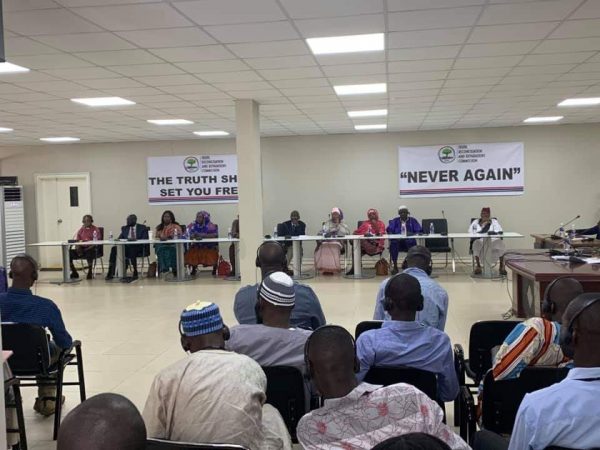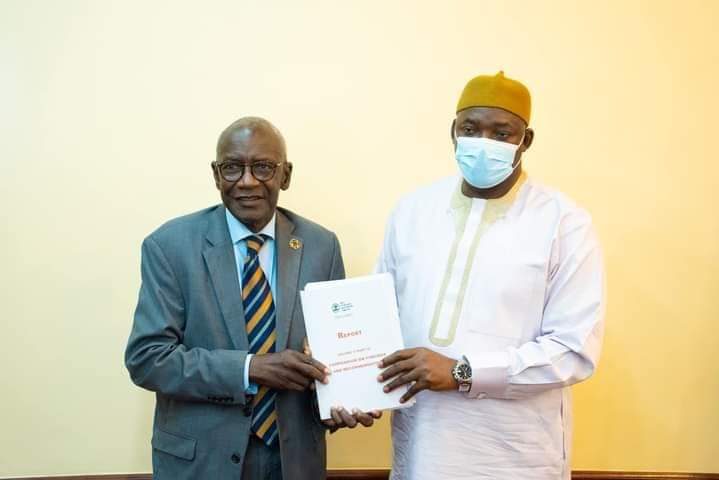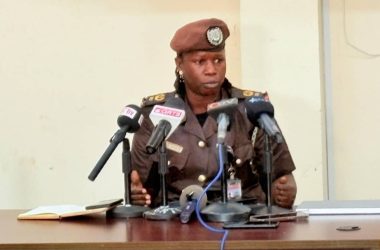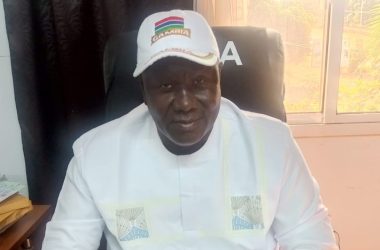 The Gambian truth commission’s call for the prosecution of former officials who committed the worst human rights abuses during the 1994-2017 rule of former president Yahya Jammeh should be followed by a process of criminal accountability, 11 Gambian and international groups said today.
The Gambian truth commission’s call for the prosecution of former officials who committed the worst human rights abuses during the 1994-2017 rule of former president Yahya Jammeh should be followed by a process of criminal accountability, 11 Gambian and international groups said today.
On November 25, 2021, the Gambia Truth, Reconciliation, and Reparations Commission (TRRC) delivered its final report to President Adama Barrow. In a public statement, TRRC Chair, Dr. Lamin J. Sise, said the Commission had “identified and recommended for prosecution those most responsible for gross human rights violations and abuses” and that “the individuals involved in perpetrating the violations and abuses must be held accountable for their crimes.”
The TRRC said it had set forth the names of those whose prosecutions it was recommending “expressly in the relevant sections of the report.” While it did not name them today, there is no doubt that Yahya Jammeh was at the top of that list, the groups said.
“Even if they didn’t reveal his name today, the commission left no doubt that Yahya Jammeh was top among the former officials whose prosecutions it was recommending,” said Reed Brody of the International Commission of Jurists, who works with Jammeh’s victims. “This report begins the countdown to the day Yahya Jammeh will have to face his victims. Whether it’s in The Gambia or before an international court, it will be very difficult now for him to escape justice.”
The Commission said that it had found that the abuses had resulted in the death of “240-250 Gambians and non-Gambians in the hands of State or its agents.”
Witnesses before the TRRC, including former direct perpetrators, tied Jammeh to the killing and torture of scores of political opponents, the murder of over 50 West African migrants, “witch hunts” in which hundreds of people were arbitrarily detained, and a sham treatment program that forced HIV-positive Gambians to give up their medicine and put themselves under Jammeh’s personal care. Survivors and former aides also described how Jammeh raped and sexually assaulted women brought to him.
“The results are in,” said Baba Hydara, whose father, the newspaper editor Deyda Hydara, was assassinated in 2004 . “We have the truth. Now we need justice, justice for my father, justice for all of Jammeh’s victims, and justice for Gambian society as a whole.”
Since beginning public sessions in January 2019, the commission heard from 393 witnesses, including former government insiders such as ministers, police and intelligence chiefs, and members of the notorious paramilitary “Junglers” unit, in addition to experts and numerous victims.
The TRRC also said it was making recommendations in terms of reparations, banning of individuals from public service, the repeal, the repeal of draconian laws and decrees still in the law books, legal and institutional reforms and training and capacity building of security and other personnel.
According to the act creating the TRRC, the president shall within 30 days transmit the full report to the National Assembly and the United Nations, as well as provide public summaries of the report. Within six months, it must issue a white paper containing its proposed plan on the implementation of the commission’s recommendations. The 11 groups urged the government, however, to publish the summaries and begin implementing the recommendations immediately. In particular, they said, the government should begin planning now for a court to avoid delays in funding and establishing it.
How to respond to the commission’s recommendations has been a key issue in the Gambian elections scheduled for December 4, 2021.
Jammeh, who ruled The Gambia from 1994-2017, has lived in exile in Equatorial Guinea since his departure from Gambia in January 2017 following his loss to Barrow in presidential elections whose results he refused to accept. The president of Equatorial Guinea, Teodoro Obiang, has said that he would “protect” Jammeh from prosecution but Equatorial Guinea’s ratification of the 1984 UN Convention against Torture obliges it to either prosecute or extradite alleged torturers such as Jammeh who are on its territory. The groups expressed hope that other countries whose citizens were killed by the Jammeh regime would join The Gambia in seeking Jammeh’s trial.
“I have been fighting for 15 years for truth and for justice for my companions who were killed,” said Martin Kyere of Ghana, the sole survivor of more than 50 West African migrants from eight countries killed by the Junglers, allegedly on Jammeh’s orders. Kyere jumped into the forest from a moving truck carrying other detained migrants and returned to Ghana to rally the victims’ families. “Ghana, Nigeria, Senegal, and all the countries whose citizens were killed should support a criminal investigation of Jammeh for the massacre of the migrants.”
Three alleged accomplices of Jammeh have already been detained and are under investigation or facing trial around the world under the legal principle of universal jurisdiction, including two former Junglers, Michael Sang Correa in the United States, and Bai L in Germany, as well as Gambia’s former interior minister, Ousman Sonko, in Switzerland.
The 11 groups calling for accountability include the Africa Centre for International Law and Accountability (ACILA), AIDS-Free World, the Center for Justice and Accountability, EG Justice (Equatorial Guinea), the Gambia Center for Victims of Human Rights Violations, Guernica 37 International Justice Chambers, Human Rights Watch, the International Commission of Jurists, Solo Sandeng Foundation, TRIAL International, and the Women’s Association for Victims’ Empowerment (WAVE).





